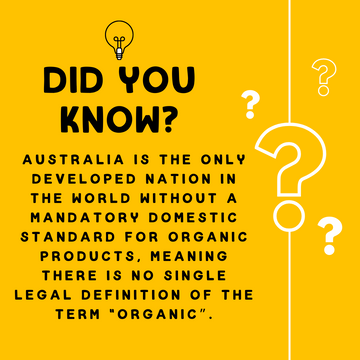
You might have seen some media coverage of late referring to a complex term called Domestic Regulation.
Our own Farmer Mick was interviewed by ABC Rural to talk about this issue and what it means not only for the industry, but importantly for the consumer. Read on for our take on this long overdue reform.
What is domestic regulation?
Did you know that in Australia, any person or product can be labelled as organic, without any claim or certification to back it up. I have made the mistake before of purchasing an "organic choice" product, thinking it was an organic dishwashing liquid, only to realise it isn't at all. You'd see it everywhere if you're aware of the use of it. Cafe's called organic such and such, only to serve conventional foods. You even see it at farmers markets. Produce labelled as organic without a certification number. It's pretty tough as a consumer to know what you're getting sometimes.
Domestic regulation is a term applied to the national reform required to regulate the organic industry and regulate the use of the word organic.
Why does it really matter?
Well we flagged it above - without domestic regulation, you really don't know what you're buying. It also has huge impacts on the organic industry with exporting products, as well as on farmers that are certified organic.
Choosing to become certified organic as a producer or manufacturer comes with a lot of extra paperwork and costs, but beyond that, gives our consumers a great deal of reassurance that the produce is being grown or produced without chemicals. Being able to label our produce as certified organic is important - and is often undermined when anyone can call their produce organic even when it is conventional.
Regulatory Bureaucracy
You'd think this should be a fairly easy process to be able to agree on a national standard for the use of the word organic......however this issue has been under process since December 2020, and still no closer to an outcome. IN December 2020 the Minister for Agriculture formed an advisory group to assess what this should look like, and later engaged Price Waterhouse Coopers to undertake consultation and determine the need for and benefits of domestic regulation.
Despite over 80 submissions and extensive support for the domestic regulation agenda, the Minister abandoned plans to continue with the reform on the basis that the PWC report suggested the cost benefit analysis was too difficult to calculate.
In short, they ignored their own advisory group, completely missed the point of regulation and determined that the benefits of introducing regulation were not enough.
One of the Advisory group members even noted:
“Minister Watt said today he was worried that domestic regulation would create a cost that would be passed on to consumers. We already use certified organic ingredients wherever possible. If we got domestic regulation, we wouldn’t be looking to put our price up, this is about those competitors who are not regulated.”
A united voice & hopeful future
In response to this frustrating turn of events, the organic industry has banded together to form the Organic Industry Discussion Group (OIDG) to advance the interests of the organic sector, including the pursuit of domestic regulation.
This long overdue cohesion of Australia's regulatory bodies and industry groups brings together key representatives outside of the government agenda, to drive domestic regulation as an industry voice.
Here's hoping that the alliances formed in this Discussion group can push domestic regulation back into the Government's priorities and bring about a much needed reform for consumers and producers alike.
For more info on Domestic Regulation please visit:
Australian Organic Limited: https://austorganic.com/about-us/regulation/




